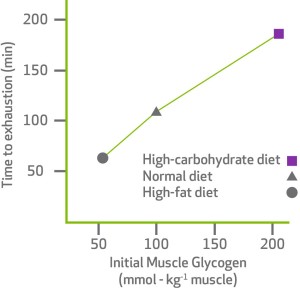Why Glycogen is Important in Sports
During the past 50 years, a significant volume of scientific research has consistently shown the critical role of glycogen for optimal athletic performance. Glycogen is how the body stores carbohydrates for energy at the muscular level.
Despite its limited storage capacity, glycogen is the body’s predominant source of energy during moderate to high-intensity exertion.
Importance of High Muscle Glycogen
High muscle glycogen content allows athletes in both endurance sports and intermittent sprint sports (i.e., team games) to perform at a higher intensity level. In endurance athletes, high muscle glycogen content can increase the time to fatigue during exertion. In addition, multiple studies have indicated that endurance athletes completing time trials can perform better with high muscle glycogen content than with lower glycogen levels. In studies on intermittent sprint exercise simulating the demands of team sports, athletes can spend more time at higher intensity levels and improve their performance when they have high muscle glycogen content. Higher muscle glycogen content allows soccer players to spend more time in moderate- to high-speed running and allows hockey players to skate longer and faster during each shift.
Risks of Low Muscle Glycogen Content
Athletes with low muscle glycogen content will experience a decrease in exertion capacity as well as an increased risk for overtraining and muscle damage. Due to the high demand for glycogen as energy for exertion, many athletes have some pattern of glycogen depletion. During moderate- to high-intensity exertion, when glycogen content levels are low or there is glycogen depletion, an athlete may enter a catabolic situation (muscle breakdown) where the muscle may “eat itself to feed itself” by increasing the amount of protein and amino acids used for energy purposes. This situation may lead to muscle damage and chronic overtraining. In fact, muscle damage limits the capacity of the muscles to store glycogen, so even while consuming a high-carbohydrate diet, an athlete can have difficulty maintaining adequate glycogen stores if the muscles are damaged.
Research indicates a correlation between training and competing with high muscle glycogen content and improved exertion capacity and overall performance.

Glycogen is the body’s predominant source of energy during moderate- to high-intensity exertion
Results suggest that muscle glycogen availability can affect performance during both short-term and more prolonged high-intensity intermittent exercise1
Optimize Performance and Reduce Injury
The patented MuscleSound methodology generates immediate data reflective of current muscle-specific glycogen content to help trainers, athletes and coaches identify the necessary amount of carbohydrates one must consume to fully restore one’s glycogen content for optimal performance.
Additionally, MuscleSound delivers immediate data with post-performance scans that can identify the warning signs of muscle fatigue, muscle damage and overtraining. This post-performance insight allows for the concentrated muscle recovery necessary to optimize consistent future performance and prevent long-term muscle injury.
MuscleSound allows users to not only optimize, but also capitalize on, the reliable and regular measurement of muscle glycogen content with their patented scientific methodology, practical technology and cloud-based software. The non- invasive, real-time and proactive muscle-specific benefits make MuscleSound superior to existing methods of glycogen testing, performance preparation and recovery technologies.
[1] Balsom PD, Gaitanos GC, Soderlund K, Ekblom B. “High-intensity exercise and muscle glycogen availability in humans.” Acta Physiol Scand. 1999 Apr;165(4):337-45.
